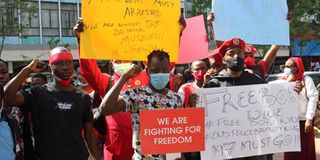When it comes to social activism, our charity should start at home

Ugandan supporters of opposition presidential candidate Bobi Wine, protest his arrest outside the Ugandan High Commission in Nairobi on November 19, 2020.
What you need to know:
- The power of social media as a political tool has been utilised like never before to educate others on social issues.
- End Police Brutality movement received little online support from a public that had been tweeting about BLM just the day before.
It has been an eventful 2020. From Covid-19 to social justice movements, this year is one that will be remembered for a long time to come.
As the months have gone by, it has been interesting to observe the effects these global issues have had on a local level, particularly when it comes to activism.
Like others elsewhere, Kenyan youths took to social media to voice their concerns about the broken systems around the world. They showed tremendous support for the Black Lives Matter (BLM) movement in North America, and the End SARS movement in Nigeria.
The power of social media as a political tool has been utilised like never before to educate others on social issues, expose the heinous acts of tyrannical governments and mobilise the masses to attend protests and sign petitions, in the hope of bringing about real-life change.
But it has been disappointing to see that many Kenyans who are loud and passionate about other peoples’ issues remain silent when it comes to our own.
End Police Brutality
For instance, the local End Police Brutality movement received little online support from a public that had been tweeting about BLM just the day before, and when it came to actual protests that were happening in Nairobi, it was disturbing to see the different treatment given to attendees, depending on their class.
For example, the attendees of a June Black Lives Matter protest, upper-middle-class Kenyans and white folks, had the protection of the police. On the same day, residents of Kibra also took to the streets to protest the increasing instances of police brutality while enforcing the curfew.
Although they were equally peaceful, the Kibra demonstrators were once again brutalised by the police, amid tear gas and orders to disperse.
If asked, many Kenyans would say that they do not see the point of going to such protests, but one has to wonder whether more people would march on the streets if the police killings were happening in affluent areas such as Runda, Kileleshwa, Karen and Mountain View.
Wema is a 20-year-old student at the University of Kent, UK.
Are you aged 10-20 and would like to be Nation’s young reporter? Email your 400-600-word article to [email protected]



